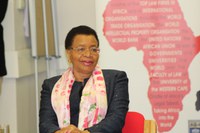Graça Machel reflects on the founding principles of the SA Freedom Charter and Constitution
The lecture, titled ‘A call for a nation’s soul searching’, reflected on the founding principles of the South African Freedom Charter and Constitution. Machel also addressed the spate of violence, moral degeneration and socio-economic inequalities in the country, after which she called for a framework for healing and action.
Machel reminded the audience that the Freedom Charter was a collectively prepared document bringing together the African National Congress (ANC) and its allies, the South African Indian Congress, the South African Congress of Democrats and the Coloured Peoples’ Congress. ‘Adopted at the Congress of the People in 1955, it stands as a reminder of the vision behind a people-led, human rights based vision for a new South Africa.’ She added that ‘those who penned the Freedom Charter knew very well that a peaceful, vibrant, healthy South Africa would never be attained unless an equitable society was built.’ Following from the Freedom Charter, the South African Constitution lays out the blueprint for a new, equitable South Africa.
However, despite having been spared the ravages of a civil war as the Apartheid regime was dismantled, and despite having made a relatively peaceful transition to democracy, ‘we are at war with ourselves, with each other and with our institutions.’ This war is manifested by such high levels of brutal violence, including violence against children, women and the elderly. Others include brutal xenophobic attacks, service delivery riots and political assassinations, among others. As a society, we have normalized violence and have yet to unlearn how to interact with one another from a space of aggression. While our political and economic transformation are far from perfect, we have paid no attention to our social transformation; ‘we did not do the same soul searching and brainstorming to reconfigure how we live and operate as a harmonious society.’ We therefore need to rewire ourselves away from violence as a response to challenges, and ‘we need plan of redress for our social ills’ as well as a ‘treatment plan for our broken society.’
On socio-economic inequalities, Machel pointed out that ‘while we put in place a system of governance to replace our old political framework and gave great thought to our political institutions, we did not give the same consideration to revamping our socio-economic landscape.’ More work therefore needs to be done as economic inequality is still a significant problem, which is both ‘heart breaking and unacceptable this far into our new dispensation.’
While not a panacea, the notion of Ubuntu, Machel noted, is perhaps ‘a good starting point and framework for our soul searching and healing of our broken, disconnected state. We need to connect with ourselves and with each other better.’ She concluded by calling on UWC, ‘a stellar institution of progressive thought, to spearhead this process of societal transformation.’
This event was chaired by the director of the Dullah Omar Institute, Prof Jaap de Visser. Among other distinguished guests at the lecture were a host of members of the Omar family including Ms Fareda Omar, widow of the late Dullah Omar and his sister, Ms Latifa Omar, who gave a word of thanks on behalf of the Omar family. Before the commencement of the lecture, Graça Machel met with a group of undergraduate and post-graduate UWC students for an interactive question and answer session, which was very enriching and inspiring for the students. She was welcomed to UWC and the lecture by Ms Nita Lawton-Misra, the Registrar of the University of the Western Cape.
The 11th Dullah Omar Memorial Lecture was funded by Konrad-Adenauer-Stiftung and Webber Wentzel.

